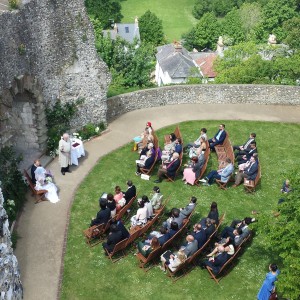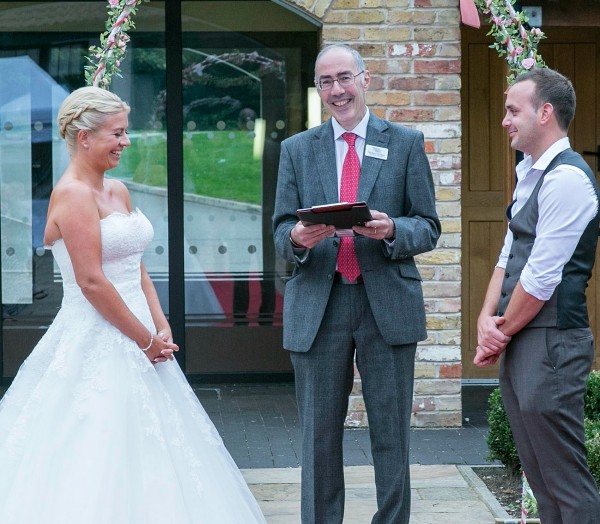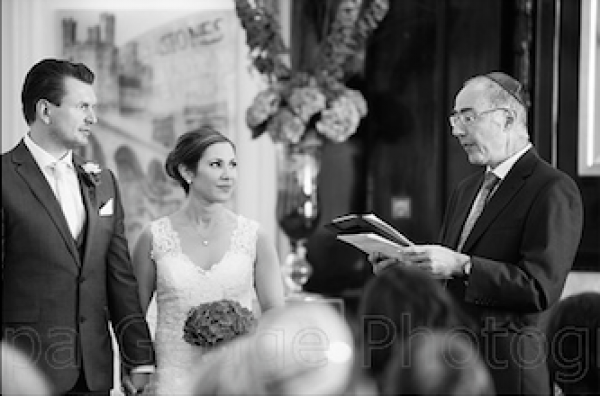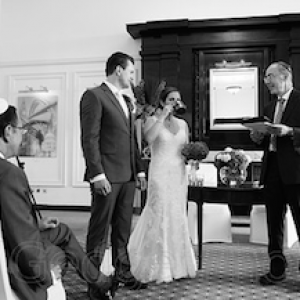by Michael | Nov 12, 2015 | Blog
A full religious wedding is not necessarily everyone’s choice – hence the relevance of civil celebrants such as myself! However, if you opt for a church wedding, you should get advice from your officiating priest, but you may still find the following helpful.
The prospect of your big day, especially if it really is to be big, can be pretty unnerving. Fun, exciting and wonderful – but unnerving. There are so many questions to be answered.
Let’s take first things first.
What happens at the Church?
Assuming you have chosen a Church wedding, you will need ushers (who should be the first to arrive, naturally). Traditionally, they should guide the bride’s family and friends to the left side of the altar and the groom’s to the right.
The groom and best man should arrive at least 15 minutes before the ceremony so the photographer can take a few shots before they enter the church (they will occupy the front right-hand pew).
Bridesmaids arrive about 10 minutes before the ceremony. Together with the bride’s mother (normally), they wait at the church door for the bride to arrive. (Another moment for the photographer?)
The bride, along with her father-to-be, will be greeted on arrival by the officiant. The photographer will certainly want to be in attendance here too!
Who goes where?
The bride’s father, family, and any relations and friends will have the officiant ahead of them on their right; obviously, the officiant will be ahead, but to the left, of the best man, groom’s family and selected relations and friends. The bride and groom, chief bridesmaid and bridesmaids will be central, facing the officiant in front of the altar.
Entry
The wedding train should process slowly (remarkably difficult to do!) to the altar, and the father hand his daughter to the groom before going to his place.
Exit
The bride and groom followed by bridesmaids (and/or pageboys) will lead out at the end of the ceremony. Behind them, on the left, will be the chief bridesmaid, bride’s mother and groom’s mother; on the right, the best man, groom’s father and bride’s father.
The above follows the traditional order and there may be room for a little flexibility.
If, for any reason, you are prevented from marrying in a church, remember that a civil celebrant can create and conduct a religious ceremony for you, which may turn out to be every bit as moving.

by Michael | Nov 12, 2015 | Blog
I’ve often been asked how I came to be a Civil Celebrant.
I never had any ambition to do such work. (In fact, three years ago I didn’t even know what one was!)
I only heard about it by chance.
If I’m absolutely honest, it all came about because I was interested in 400 prostitutes!
Now don’t get me wrong, please. I may be an active man, but not in the way you may be thinking!
I innocently went to hear a talk by somebody who had considerable experience with prostitutes. He had made a fortune many years back by selling answering machines to a niche market nobody had tapped before: prostitutes!
After the presentation, I had a chat with him, and it turned out that he was now a celebrant.
He told me that he helped people who wanted a ceremony that was bespoke – not formulaic. He worked with them to construct a ceremony that would mean the most to them (and, hopefully, their guests). It could be religious, semi-religious, non-religious – anything. It could be held anywhere – perhaps a licensed religious building, a hotel, a beach or a mountain top.

The ceremonies included weddings (straight or gay), vow renewals, naming blessings and handfastings. (Not to mention funerals.)
Anyway, as I listened to David, I got drawn in. This was something different, this was exciting, this was something I could do well (I have considerable experience as a public presenter) and something that would enable me to make a difference to others.
When could I start?!
Well, I trained late in 2012, and was sufficiently enthused that I then decided to train to become a funeral celebrant. I’m now almost three years down the celebrantt line, and loving it!
Who’d have thought that 400 prostitutes would have made such a difference in my life!

by Michael | Nov 11, 2015 | Blog
Weddings are meant to be happy, wonderful, unforgettable occasions. Of course, you want a harmonious wedding. It, almost inevitably, will bring stress in its wake, and this sometimes spills over into the big day (and even beyond).
Here are some things to look out for, to ensure that the wedding day remains unforgettable for the right reasons!
Money
Money can be one of the sources of stress – after all, weddings do not come cheap. Agree and set a budget from day one (and stick to it).
The family
Usually, conflict is family-based. It can be between parents and the couple, but it can also be between the fiancés. Sometimes, the conflicts are the result of deep-seated issues that should have surfaced and been resolved previously. Often, the subjects are very petty.
The wedding should be a time of peace and harmony. Try reason and compromise where conflict arises (although there may come a time when you have to put your foot down!).
Intolerance
Features such as jealousy or desire for the limelight can be powerful motives for unpleasantness. Strong personalities who are unable or unwilling to see, let alone accept, other people’s viewpoints can create all sorts of problems.
An example may be when someone will not accept the idea of a gay wedding. It may be possible to talk them round and, if you can get them to the ceremony, they may actually enjoy it!
Be prepared to offer someone who means a lot to you a special role (eg as a reader) so that they feel valued and will then be prepared to give ground elsewhere.
Targets
You also have to achieve a balancing act. If you have a limited budget, whom do you NOT invite? Have you got enough jobs to distribute (eg usher, etc.) and will anybody feel left out? Have you done the best you can with the seating plan?
Guests
It is not just the hosts who can be affected by finances; it may also be the guests. They may need to lay out to get to the wedding, to stay overnight, organise baby-sitting, buy special clothes and purchase a present for the newly-weds.
There may be things you can offer (eg crèche or activities to entertain the children) to ease the stress for those guests.
Grudges
The period of time surrounding a wedding is not the time to address resentment and grudges. Family and friends need to ensure that they have any personal issues in check that might possibly upset (or even poison) the atmosphere at the wedding. If possible, these difficulties should be aired in a different environment, in a civilised way.
Weddings are all about love and warmth.
As long as underlying tensions have been dealt with effectively, well before the big day, the couple, their families and the guests have every chance of enjoying a wonderful, inspiring and, yes, unforgettable wedding.
by Michael | Nov 3, 2015 | Blog
How difficult can planning a wedding be?
Well, don’t go asking that question to too many people!
Even if finances don’t enter into it (but they invariably do), you have so much to consider. Things like the venue, any theme you might be having, the reception, the dress, decoration, presents, catering, flowers, cakes, photographer, the guest list – it seems never-ending.
One thing people tend to overlook (or postpone) is the ceremony itself. In many cases, couples assume that the service must either be a full religious one or a register office ceremony.
You do not, however, need to put on that straight-jacket. In fact, you have a lot more choice than that. The only obligation you must comply with is to have your wedding legally documented. (This will normally be part of the full religious service.)
Another Approach
Not everyone is comfortable with a full religious service. Nor is it permitted for all, either. So what alternative is there, particularly if you want a personalised ceremony, which a register office service – or indeed, the church – won’t really offer?
You are quite welcome to celebrate your marriage wherever and however you wish (well, within reason!), once the registrars have done their bit. So you could go to the register office the day before your wedding in jeans, with two witnesses (remember to make an appointment first, though) to become legally married, and then appear at the venue of your choice, relaxed and happy, for what to all intents and purposes is your wedding. Then your celebrant can conduct the ceremony of your dreams that reflects your personalities and beliefs.
You can even have the celebrant-led ceremony directly after the registrars have left the room, if you want consecutive ceremonies.
Examples
This works particularly well for people of different religions who want at least a religious element, but cannot be married in their church/synagogue/mosque/temple etc. One ceremony I am conducting will include the bride’s mother, who is Russian, presenting icons and also bread to the couple. I have gladly put Jewish rituals and blessings into several part-Jewish weddings.
Some people don’t want any religion really, but are keen to keep their families happy, so choose to include a few token elements – maybe a religious reading, prayer or blessing.
Others want their wedding to stand out, so they may incorporate religious – or pagan – elements that are, to say the least, unusual. For example, they might appreciate a Unity Sand ceremony. Each of the couple has a container of sand – one might be red, the other blue. Together, accompanied by suitable words spoken by the celebrant, they pour the contents of their container into a funnel, and the different sands merge in a third container (which the couple take home) to symbolise their new unity.
Some may choose a handfasting – partial or total (I talked about this in a recent blog).
The point is that you can work together with your celebrant and put together your ceremony. It’s your big day, and you should be able to celebrate it as you really want. Let it be perfect for you.

by Michael | Oct 13, 2015 | Blog
I am beginning to learn that it doesn’t really pay to hide one’s light under a bushel.
Parlez-vous mariage?
People think of me as a civil celebrant, but I am also a linguist. Apart from a decent command of my native language, I have a degree in French and Russian, speak fluent German, read Hebrew and get by in Czech and Italian.
Being the sort of businessman that I am, it never occurred to me until recently that that might be an asset to my current profession! But now I know differently.
One of my present assignments is working on a wedding service for a couple from mixed cultures: he is British, but she is Russian. There will be a few guests coming over from Magnetogorsk, so I suggested welcoming them in their native language. Wow! This idea has gone down a treat!
Well, when you think about it, it makes sense. Of course, I’ll have to work out how best to market this asset, as the language bit may appeal to quite a number of couples. Indeed, maybe this would lead to a few ‘gigs’ abroad, which would be very exciting!
A Mystery?
The Hebrew side proved very useful last August when I conducted a Jewish wedding. No, I am not a rabbi; in fact, the couple’s rabbi was among the guests and (I’m relieved to say!) he professed himself very happy with my service.
 Photos: Philippa Gedge Photography
Photos: Philippa Gedge Photography
In case you’re a bit baffled, let me explain that the groom was marrying a non-Jewess, who, though a regular synagogue-attendee, had no desire to convert, so the rabbi couldn’t conduct the ceremony. I was therefore approached to put together and lead the ceremony.
In the event, I led a (slightly creative) service, containing some elements I had suggested and some the couple had included.
As that bushel has now been removed, I’d like to conclude with the testimonial I received from the couple for that wedding:
“Michael Gordon conducted a Jewish religious wedding ceremony for us immediately following our civil wedding ceremony. Michael was very receptive to our input and the whole process was smooth and pleasant. On our wedding day, Michael impressed everyone with his delivery, warmth, good humour and professionalism. We had many comments afterwards from our guests saying how impressed they were with Michael and how they felt a part of the ceremony (something that was important for us and which Michael helped us to achieve).
“Michael is happy to tailor a ceremony to meet a couple’s particular requirements. His knowledge of Hebrew is both impressive and authentic. We would certainly recommend Michael to any couple who want to add a spiritual or religious element to their wedding celebrations without necessarily having something formal in a church or synagogue.”
C’est magnifique!




